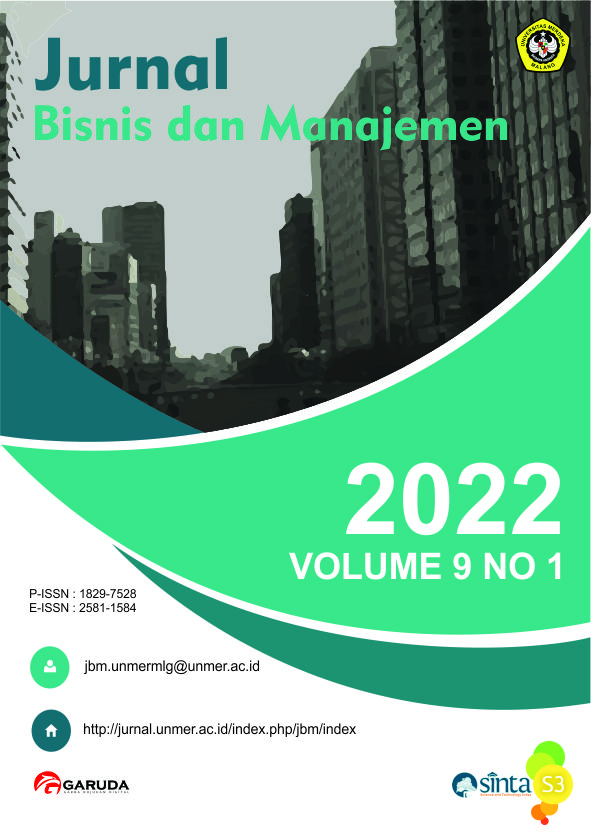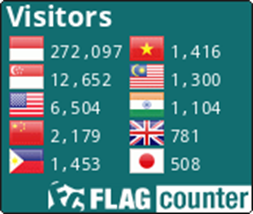E-wom's Role in Driving Purchase Intention during Covid-19 Pandemic
DOI:
https://doi.org/10.26905/jbm.v9i1.7389Keywords:
E-WOM Quality, E-WOM Quantity, E-WOM Credibility, Purchase IntentionAbstract
Testimonials are one of the marketing tools that can have a big impact on consumers. Testimony is a form of electronic word of mouth (E-wom) where the information contained in E-wom will be very important as a reference for consumers when they want to make a purchase of a product. This research aims to find out the influence of E-wom quality, E-wom quantity, and E-wom credibility on the purchase intention of fashion products on the online marketplace. The population in this study are people who have visited marketplaces such as tokopedia, shopee, and bukalapak in Surabaya. The sampling method used is purposive sampling, with the number of samples being 385 respondents. Respondent data is collected by distributing questionnaires online. This study used multiple linear regression analysis in SPSS 22 as an analysis tool. The findings of this analysis show that E-wom quality affects purchase intention, E-wom quantity affects purchase intention, and E-wom credibility affects purchase intention.
Â
Downloads
References
Aini, S. N., & Zuliestiana, D. A. (2019). Dampak E-Wom Credibility, Quality, Quantity Pada Minat Beli Dengan Peran Mediasi Citra Perusahaan Dalam Facebook the Body Shop Indonesia. E-Proceeding of Management, 6(1), 84–93.
Akram, U., Hui, P., & Sohaib, M. (2018). Impact of eWOM and risk-taking in gender on purchase intentions: evidence from Chinese social media. International Journal of Information Systems and Change Management, 10(2), 101. https://doi.org/10.1504/ijiscm.2018.10015819
Awad, N. F., & Ragowsky, A. (2008). Establishing trust in electronic commerce through online word of mouth: An examination across genders. Journal of Management Information Systems, 24(4), 101–121. https://doi.org/10.2753/MIS0742-1222240404
Bataineh, A. Q. (2015). The Impact of Perceived e-WOM on Purchase Intention: The Mediating Role of Corporate Image. International Journal of Marketing Studies, 7(1), 126–137. https://doi.org/10.5539/ijms.v7n1p126
Bhattacherjee, A., & Clive, S. (2016). Influence Processes for Information Technology Acceptance : An Elaboration Likelihood Model1. MIS Quarterly, 30(4), 805–825.
Cheung, C. M. K., Lee, M. K. O., & Rabjohn, N. (2008). The impact of electronic word-of-mouth: The adoption of online opinions in online customer communities. Internet Research, 18(3), 229–247. https://doi.org/10.1108/10662240810883290
Cheung, M., Luo, C., Sia, C., & Chen, H. (2009). Credibility of electronic word-of-mouth: Informational and normative determinants of on-line consumer recommendations. International Journal of Electronic Commerce, 13(4), 9–38. https://doi.org/10.2753/JEC1086-4415130402
Chevalier, J. A., & Mayzlin, D. (2006). Chevalier2006. Journal of Marketing Research, XLIII(August), 345–354.
Fan, J., Shao, M., Li, Y., & Huang, X. (2018). Understanding users’ attitude toward mobile payment use: A comparative study between China and the USA. Industrial Management and Data Systems, 118(3), 524–540. https://doi.org/10.1108/IMDS-06-2017-0268
Fan, Y.-W., & Miao, Y.-F. (2012). Effect of Electronic Word-of-Mouth on Consumer Purchase Intention: the Perspective of Gender Differences. International Journal of Electronic Business Management, 10(3), 175–181.
Fang, Y. H. (2014). Beyond the credibility of electronic word of mouth: Exploring eWOM adoption on social networking sites from affective and curiosity perspectives. In International Journal of Electronic Commerce (Vol. 18). https://doi.org/10.2753/JEC1086-4415180303
Filieri, R. (2015). What makes online reviews helpful? A diagnosticity-adoption framework to explain informational and normative influences in e-WOM. Journal of Business Research, 68(6), 1261–1270. https://doi.org/10.1016/j.jbusres.2014.11.006
Fogg, B., & Tseng, S. (1999). Credibility and Computing Technology. Communications of the Acm, 42(5), 39–44.
Huyen, T. T., & Costello, J. (2017). Quality versus Quantity: An Investigation into Electronic Word of Mouth’s Influence on Consumer Buying Intention. Journal of Promotional Communications, 5(2), 137–155.
Idris, C. A. (2017). Analisis pengaruh kualitas online Word-Of-Mouth dan keamanan terhadap minat beli dengan kepercayaan sebagai variabel intervening pada pembelian produk fashion di situs zalora Indonesia di semarang. Diponegoro Journal of Management, 6(3), 1–11. Retrieved from http://ejournal-s1.undip.ac.id/index.php/dbr
Jeong, H. J., & Koo, D. M. (2015). Combined effects of valence and attributes of e-WOM on consumer judgement for message and product The moderating effect of brand community type. Internet Research, 25(1), 2–29. https://doi.org/10.1108/IntR-09-2013-0199
Kim, C., Mirusmonov, M., & Lee, I. (2010). An empirical examination of factors influencing the intention to use mobile payment. Computers in Human Behavior, 26(3), 310–322. https://doi.org/10.1016/j.chb.2009.10.013
Kim, G., Shin, B., & Lee, H. G. (2009). Understanding dynamics between initial trust and usage intentions of mobile banking. Information Systems Journal, 19(3), 283–311. https://doi.org/10.1111/j.1365-2575.2007.00269.x
Lin, C., Wu, Y.-S., & Chen, J.-C. V. (2013). Electronic Word-of-Mouth: The Moderating Roles of Product Involvement and Brand Image. Proceedings of 2013 International Conference on Technology Innovation and Industrial Management, 29–47.
Lkhaasuren, M., & Nam, K.-D. (2018). The Effect of Electronic Word of Mouth (eWOM) on Purchase Intention on Korean Cosmetic Products in the Mongolian Market. Korea International Trade Research Institute, 14(4), 161–175. https://doi.org/10.16980/jitc.14.4.201808.161
Maia, C., Lunardi, G., Longaray, A., & Munhoz, P. (2018). Factors and characteristics that influence consumers’ participation in social commerce. Revista de Gestão, 25(2), 194–211. https://doi.org/10.1108/rege-03-2018-031
Mehyar, H., Saeed, M., Al-Ja’afreh, H. B. A., & Al-Adaileh, R. (2020). The impact of electronic word of mouth on consumers purchasing intention. Journal of Theoretical and Applied Information Technology, 98(2), 183–193.
Ohanian, R. (1990). Construction and validation of a scale to measure celebrity endorsers’ perceived expertise, trustworthiness, and attractiveness. Journal of Advertising, 19(3), 39–52. https://doi.org/10.1080/00913367.1990.10673191
Park, D. H., & Kim, S. (2008). The effects of consumer knowledge on message processing of electronic word-of-mouth via online consumer reviews. Electronic Commerce Research and Applications, 7(4), 399–410. https://doi.org/10.1016/j.elerap.2007.12.001
Park, D. H., Lee, J., & Han, I. (2007). The effect of on-line consumer reviews on consumer purchasing intention: The moderating role of involvement. International Journal of Electronic Commerce, 11(4), 125–148. https://doi.org/10.2753/JEC1086-4415110405
Prendergast, G., Ko, D., & Yuen, S. Y. V. (2010). Online word of mouth and consumer purchase intentions. International Journal of Advertising, 29(5), 687–708. https://doi.org/10.2501/s0265048710201427
Tajuddin, U. N. R. A., Hassan, L. F. A., Razak, N. A., & Othman, A. K. (2018). Role of Brand Image on the Relationship Between E-Wom and Consumer Purchase Intention : Dietary Supplementconsumers Perspective. International Journal OfBusiness AndManagement Studies, 07(02), 583–596.
Teng, S., Khong, K. W., Goh, W. W., & Chong, A. Y. L. (2014). Examining the antecedents of persuasive eWOM messages in social media. Online Information Review, 38(6), 746–768. https://doi.org/10.1108/OIR-04-2014-0089
Tien, D. H., Amaya Rivas, A. A., & Liao, Y. K. (2019). Examining the influence of customer-to-customer electronic word-of-mouth on purchase intention in social networking sites. Asia Pacific Management Review, 24(3), 238–249. https://doi.org/10.1016/j.apmrv.2018.06.003
Yusuf, A. S., Che Hussin, A. R., & Busalim, A. H. (2018). Influence of e-WOM engagement on consumer purchase intention in social commerce. Journal of Services Marketing, 32(4), 493–504. https://doi.org/10.1108/JSM-01-2017-0031
Downloads
Published
How to Cite
Issue
Section
License
Authors who publish with this journal agree to the following terms:
(1) Copyright of the published articles will be transferred to the journal as the publisher of the manuscripts. Therefore, the author confirms that the copyright has been managed by the journal.
(2) Publisher of Jurnal Bisnis dan Manajemen is University of Merdeka Malang.
(3) The copyright follows Creative Commons Attribution–ShareAlike License (CC BY SA): This license allows to Share — copy and redistribute the material in any medium or format, Adapt — remix, transform, and build upon the material, for any purpose, even commercially.














